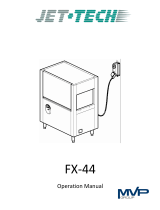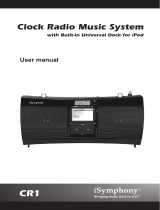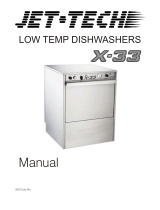Page is loading ...

18
F18-D
F
& P
T chn l Man
al
e
ica u
May 2004 Rm

INDEX
PAGE 3 OVER VIEW OF TOP CONTROL PANEL
PAGE 4 DOOR SWITCH 20548
PAGE 5 POWER SWITCH 20044, 20500
PAGE 6 PRESSOSTAT 20058
PAGE 7 WATER LEVEL SYSTEM
PAGE 8 SOLENOID VALVE 20569
PAGE 9 THERMOSTAT, RINSE 20596
PAGE 10 THERMOSTAT, WASH 20570
PAGE 11 CONTACTOR RELAY 20104
PAGE 12 START SWITCH 20519
PAGE 13 START RELAY 20067
PAGE 14 TIMER 20518
PAGE 15 TIMER SEQUENCE
PAGE 16 ELECTRICAL DIAGRAM
PAGE 17 OVERVIEW OF THE BASE
PAGE 18 WASH SYSTEM/PLUMBING
PAGE 19 WASH SYSTEM (cont.)
PAGE 20 WASH PUMP 20240
PAGE 21 DRAIN PUMP 40229
PAGE 22 HEATER ELEMENTS 20080, 20088
PAGE 23 FILL CYCLE AND HEAT CYCLE
PAGE 24 HEAT CYCLE (cont.)
PAGE 25 WASH CYCLE
PAGE 26 WASH CYCLE (cont.)
PAGE 27 DRAIN CYCLE
PAGE 28-31 CHEMICAL PUMP ADJUSTMENT
PAGE 32 ELECTRICAL SCHEMATIC
2

Front of dishwasher
Electrical component location - Top view
F-18
20570
Wash thermostat
20596
Rinse Thermostat
20058
Pressostat
20518
Timer
20519
Start cycle
switch
20108
Thermometer
20010
Lens
20042
Light
20548
Door
switch
20010
Lens
20042
Light
20044
Power
switch
(F-18)
20567
Capacitor
20532
Terminal block
20104
Contactor relay
20067
Start relay
3
1 888 275 4538 - 611
514 737 9701 - 611
FAX 514 737 2792

POWER SWITCH
Power Switch Location
20500
F-18 DP
20044
F-18
Dark Blue
Brown wire
Light Blue wire
Gray wire
Pink Wire
Brown wire
Red wire
Power Button
Drain Pump By-pass switch
4
PD - Soap Pump
BR - Micro Relay coil
BCB - Booster Contactor coil
RV - Wash Tank Heater Element
RB - Booster Tank Heater Element
DP - Drain Pump
MT - Timer Motor
MPL - Wash Pump Motor
LL - Indicator Light - Power
LC - Indicator Light - Wash Cycle
LP - Indicator Light - Temperature Ready
CA - Capacitor - wash pump
TL- Power Switch
PS- Pressure Switch
SW2- Drain Switch
CR1 + CR2 - Micro Relay Switches
M1 + M2 + M3: Timer Cam Switches
TC- Start Switch
MP - Door Switch
TB - Thermostat
TV - Thermostat
CCB - Booster Contactor Contacts
ELB - Solenoid Coil
1 888 275 4538 - 611
514 737 9701 - 611
FAX 514 737 2792

PRESSOSTAT 20058
Pressostat Location
5
TL- Power Switch
PS- Pressure Switch
SW2- Drain Switch
CR1 + CR2 - Micro Relay Switches
M1 + M2 + M3: Timer Cam Switches
TC- Start Switch
MP - Door Switch
TB - Thermostat
TV - Thermostat
CCB - Booster Contactor Contacts
ELB - Solenoid Coil
PD - Soap Pump
BR - Micro Relay coil
BCB - Booster Contactor coil
RV - Wash Tank Heater Element
RB - Booster Tank Heater Element
DP - Drain Pump
MT - Timer Motor
MPL - Wash Pump Motor
LL - Indicator Light - Power
LC - Indicator Light - Wash Cycle
LP - Indicator Light - Temperature Ready
CA - Capacitor - wash pump
Back of dishwasher
1 888 275 4538 - 611
514 737 9701 - 611
FAX 514 737 2792

Water Level System
The dishwasher water level is control by a pressure switch or
pressostat. A cup (grey plastic cylinder, #10528) located at the back of
the unit will keep an air pocket which will be pressurized as the water
level increases. The air pressure (approximately 2 inch water column)
activates a switch through a rubber tube that connects from the air trap
to the pressostat.
During the fill cycle, the water solenoid gets its signal from the
pressostat. When the pressostat is satisfied, it cuts the signal to the
solenoid valve and sends power to the thermostats and the timer
When trouble shooting this system, all components must be
considered.
Beginning with the pressostat which is adjustable.
Making sure the connection to the tube is air tight.
The tube may have an invisible crack which allows air to escape.
The air trap may be broken or the threads may have a crack also.
Adjustment (min-max)
Adjustment water level
Clock-wise for higher level
To water solenoid valve
(red wire)
from power switch
(grey wire)
To heaters and timer
(white wire)
6
1 888 275 4538 - 611
514 737 9701 - 611

Fill System & Rinse System
The dishwasher fill and rinse systems is practically the same system as they both used the same circuit.
The only difference is what is sending the signal to the water solenoid valve.
During the fill cycle, the water solenoid gets its signal from the pressostat. When the pressostat is
satisfied, it cuts the signal to the solenoid valve and sends power to the thermostats and the timer.
During the Rinse cycle, the water solenoid valve is getting its signal from the timer. When the time has
completed the rinse cycle than the solenoid is de-energized.
Because the detergent pump and the drain pump (if so equipped) are connected in parallel with the
water solenoid valve, they will all work at the same time. Why are they connected this way? Simple,
the detergent pump is connected this to inject detergent whenever new water comes into the
dishwasher. The detergent does not mix with the rinse system so it does not contaminate the rinsing
process with detergent.
The drain pump will
work whenever the
water solenoid
opens and this is to
avoid overflow
problem should the
pressostat becomes
defective and the
unit get stuck in a
fill cycle. Here it si
important to keep in
mind that this
scenario will only
work if the dynamic
(flow) water
pressure does not
exceed 25 PSI and the unit is capable of totally draining
within 1 minute. If any of those two factors exceeds the
limits then you can have an overflow situation.
The water solenoid valve will send water through the booster first and then water will travel to the
spray-arms as shown in the diagram below. The solenoid valve will fail under specific condition. High
pressure(>2.0 bar: >30 PSI) , high temperature(>60C:>140F), debris in water,
continuous work.
7

THERMOSTAT 20596
1
2
3
190F +/- 2190F +/- 2
1
2
3
Nc
No
C
Green paint
From pressostat (white)
To Wash thermostat
(blue)
To contactor
(red)
G
8
TL- Power Switch
PS- Pressure Switch
SW2- Drain Switch
CR1 + CR2 - Micro Relay Switches
M1 + M2 + M3: Timer Cam Switches
TC- Start Switch
MP - Door Switch
TB - Thermostat
TV - Thermostat
CCB - Booster Contactor Contacts
ELB - Solenoid Coil
PD - Soap Pump
BR - Micro Relay coil
BCB - Booster Contactor coil
RV - Wash Tank Heater Element
RB - Booster Tank Heater Element
DP - Drain Pump
MT - Timer Motor
MPL - Wash Pump Motor
LL - Indicator Light - Power
LC - Indicator Light - Wash Cycle
LP - Indicator Light - Temperature Ready
CA - Capacitor - wash pump
1 888 275 4538 - 611
514 737 9701 - 611
FAX 514 737 2792

THERMOSTAT 20570
1
2
3
160F +/- 2160F +/- 2
1
2
3
Nc
No
C
Orange paint
To ready light
(small black)
To wash heater element
(Large black)
From rinse thermostat (blue)
G
9
TL- Power Switch
PS- Pressure Switch
SW2- Drain Switch
CR1 + CR2 - Micro Relay Switches
M1 + M2 + M3: Timer Cam Switches
TC- Start Switch
MP - Door Switch
TB - Thermostat
TV - Thermostat
CCB - Booster Contactor Contacts
ELB - Solenoid Coil
PD - Soap Pump
BR - Micro Relay coil
BCB - Booster Contactor coil
RV - Wash Tank Heater Element
RB - Booster Tank Heater Element
DP - Drain Pump
MT - Timer Motor
MPL - Wash Pump Motor
LL - Indicator Light - Power
LC - Indicator Light - Wash Cycle
LP - Indicator Light - Temperature Ready
CA - Capacitor - wash pump
1 888 275 4538 - 611
514 737 9701 - 611
FAX 514 737 2792

CONTACTOR RELAY 20104
10
TL- Power Switch
PS- Pressure Switch
SW2- Drain Switch
CR1 + CR2 - Micro Relay Switches
M1 + M2 + M3: Timer Cam Switches
TC- Start Switch
MP - Door Switch
TB - Thermostat
TV - Thermostat
CCB - Booster Contactor Contacts
ELB - Solenoid Coil
PD - Soap Pump
BR - Micro Relay coil
BCB - Booster Contactor coil
RV - Wash Tank Heater Element
RB - Booster Tank Heater Element
DP - Drain Pump
MT - Timer Motor
MPL - Wash Pump Motor
LL - Indicator Light - Power
LC - Indicator Light - Wash Cycle
LP - Indicator Light - Temperature Ready
CA - Capacitor - wash pump
1 888 275 4538 - 611
514 737 9701 - 611
FAX 514 737 2792

DOOR SWITCH 20548
Switch Location
White
wire
White
wire
Door closed
Door opened
11
TL- Power Switch
PS- Pressure Switch
SW2- Drain Switch
CR1 + CR2 - Micro Relay Switches
M1 + M2 + M3: Timer Cam Switches
TC- Start Switch
MP - Door Switch
TB - Thermostat
TV - Thermostat
CCB - Booster Contactor Contacts
ELB - Solenoid Coil
PD - Soap Pump
BR - Micro Relay coil
BCB - Booster Contactor coil
RV - Wash Tank Heater Element
RB - Booster Tank Heater Element
DP - Drain Pump
MT - Timer Motor
MPL - Wash Pump Motor
LL - Indicator Light - Power
LC - Indicator Light - Wash Cycle
LP - Indicator Light - Temperature Ready
CA - Capacitor - wash pump
1 888 275 4538 - 611
514 737 9701 - 611
FAX 514 737 2792

Start Switch 20519
Switch Location
1
2
Function of the 20519 Start Switch
This switch, when pushed in, will start the wash and rinse cycle.
When the Start Cycle SW1 (20519) button is depressed. The
small contactor relay is energized and closes contacts CR1 and
CR2. This has two purposes. The first one is to energize both the
timer motor and the indicator light LP3 (20042). The second
purpose is for CR2 to
bypass the Start
Switch SW1.
White
wire
Pink
wire
12
TL- Power Switch
PS- Pressure Switch
SW2- Drain Switch
CR1 + CR2 - Micro Relay Switches
M1 + M2 + M3: Timer Cam Switches
TC- Start Switch
MP - Door Switch
TB - Thermostat
TV - Thermostat
CCB - Booster Contactor Contacts
ELB - Solenoid Coil
PD - Soap Pump
BR - Micro Relay coil
BCB - Booster Contactor coil
RV - Wash Tank Heater Element
RB - Booster Tank Heater Element
DP - Drain Pump
MT - Timer Motor
MPL - Wash Pump Motor
LL - Indicator Light - Power
LC - Indicator Light - Wash Cycle
LP - Indicator Light - Temperature Ready
CA - Capacitor - wash pump
1 888 275 4538 - 611
514 737 9701 - 611
FAX 514 737 2792

RELAY 20067
Relay Location
Function of the 20067 relay
This relay once activated by the start-switch signal is design to
hold the current until the first cam of the timer hits the micro
switch on the timer. At that moment the signal on the relay is
disengaged and the timer takes over the start of the wash
cycle.
If this part fails, the
start switch must be
pressed and held for
15 seconds in order to
start the wash cycle.
13
TL- Power Switch
PS- Pressure Switch
SW2- Drain Switch
CR1 + CR2 - Micro Relay Switches
M1 + M2 + M3: Timer Cam Switches
TC- Start Switch
MP - Door Switch
TB - Thermostat
TV - Thermostat
CCB - Booster Contactor Contacts
ELB - Solenoid Coil
PD - Soap Pump
BR - Micro Relay coil
BCB - Booster Contactor coil
RV - Wash Tank Heater Element
RB - Booster Tank Heater Element
DP - Drain Pump
MT - Timer Motor
MPL - Wash Pump Motor
LL - Indicator Light - Power
LC - Indicator Light - Wash Cycle
LP - Indicator Light - Temperature Ready
CA - Capacitor - wash pump
1 888 275 4538 - 611
514 737 9701 - 611
FAX 514 737 2792

TIMER 20518
Timer Location
14
TL- Power Switch
PS- Pressure Switch
SW2- Drain Switch
CR1 + CR2 - Micro Relay Switches
M1 + M2 + M3: Timer Cam
Switches
TC- Start Switch
MP - Door Switch
TB - Thermostat
TV - Thermostat
CCB - Booster Contactor Contacts
ELB - Solenoid Coil
PD - Soap Pump
BR - Micro Relay coil
BCB - Booster Contactor coil
RV - Wash Tank Heater Element
RB - Booster Tank Heater Element
DP - Drain Pump
MT - Timer Motor
MPL - Wash Pump Motor
LL - Indicator Light - Power
LC - Indicator Light - Wash Cycle
LP - Indicator Light - Temperature Ready
3
2
1
1 888 275 4538 - 611
514 737 9701 - 611
FAX 514 737 2792

TIMER 20518
1
2
TIMER SEQUENCE
1- When the Start Cycle TC (20519) button is
depressed. The small contactor relay is energized and
closes contacts CR1 (20067) and CR2 (20067). This
has two purposes. The first one is to energize both the
timer motor and the indicator light LC (20042). The
second purpose is for CR2 to bypass the Start Switch
TC.
2- The timer motor is energized and starts to turn and
closes the first contact M1 (20518) which will bypass
the small relay contactor and keep the timer motor
running during the entire cycle.
3- As the timer cam continues to turn, the second
switch M2 (20518) is closed and energizes the wash
pump motor.
4- After 150 seconds approximately, switch M2 opens
and switch M3 (20518)closes to energize the solenoid
valve (for rinsing), the drain pump and the detergent
pump. This function lasts about 20 seconds and the
circuit reverts to the beginning.
3
4
15
1 888 275 4538 - 611
514 737 9701 - 611
FAX 514 737 2792

Base component location
F-18
May 2004
16
View from under of the dishwasher
40229
DRAIN PUMP
20569
WATER
SOLENOID
VALVE
40240
WASH PUMP
20199
RINSE-AID
PUMP
10349 (F18-DP)
10351 (F18)
DRAIN CONNECTION
20588
DETERGENT PUMP
20582
TERMINAL BLOCK
60137
Drain Plug
60004
Gasket
FRONT
15019
BOTTOM HUB
WASH-ARM SUPPORT
15689
BOOSTER TANK
RINSE WATER
1 888 275 4538 - 611
514 737 9701 - 611
FAX 514 737 2792

WASH SYSTEM
17
TL- Power Switch
PS- Pressure Switch
SW2- Drain Switch
CR1 + CR2 - Micro Relay Switches
M1 + M2 + M3: Timer Cam Switches
TC- Start Switch
MP - Door Switch
TB - Thermostat
TV - Thermostat
CCB - Booster Contactor Contacts
ELB - Solenoid Coil
PD - Soap Pump
BR - Micro Relay coil
BCB - Booster Contactor coil
RV - Wash Tank Heater Element
RB - Booster Tank Heater Element
DP - Drain Pump
MT - Timer Motor
MPL - Wash Pump Motor
LL - Indicator Light - Power
LC - Indicator Light - Wash Cycle
LP - Indicator Light - Temperature Ready
CA - Capacitor - wash pump
1 888 275 4538 - 611
514 737 9701 - 611
FAX 514 737 2792

WASH SYSTEM
Wash
Rinse
18
1 888 275 4538 - 611
514 737 9701 - 611
FAX 514 737 2792

WASH SYSTEM
19
WASH PUMP . . . 40240
9A-9BMECHANICAL SEAL . . . . 40030
7A-7BPUMP BOTTOM HOUSING . . . . 40218
11 PUMP HOUSING . . . . 40083
10 IMPELLER . . . . 40269
12 GASKET . . . . 40113
1 888 275 4538 - 611
514 737 9701 - 611
FAX 514 737 2792

DRAIN PUMP 40229
Drain Pump Location
Drain opening in wash tank
20
TL- Power Switch
PS- Pressure Switch
SW2- Drain Switch
CR1 + CR2 - Micro Relay Switches
M1 + M2 + M3: Timer Cam Switches
TC- Start Switch
MP - Door Switch
TB - Thermostat
TV - Thermostat
CCB - Booster Contactor Contacts
ELB - Solenoid Coil
PD - Soap Pump
BR - Micro Relay coil
BCB - Booster Contactor coil
RV - Wash Tank Heater Element
RB - Booster Tank Heater Element
DP - Drain Pump
MT - Timer Motor
MPL - Wash Pump Motor
LL - Indicator Light - Power
LC - Indicator Light - Wash Cycle
LP - Indicator Light - Temperature Ready
CA - Capacitor - wash pump
40128
40115
40127
40129
1 888 275 4538 - 611
514 737 9701 - 611
FAX 514 737 2792
/


